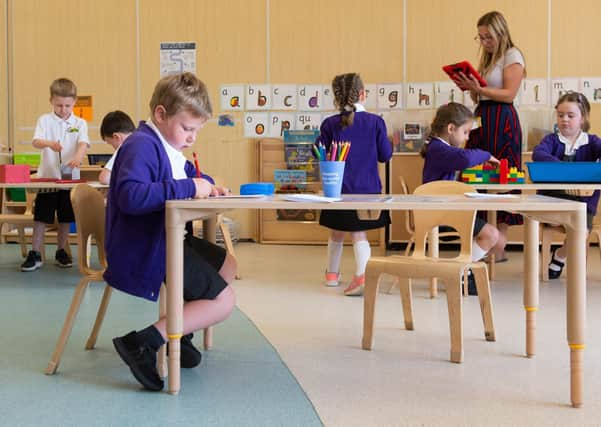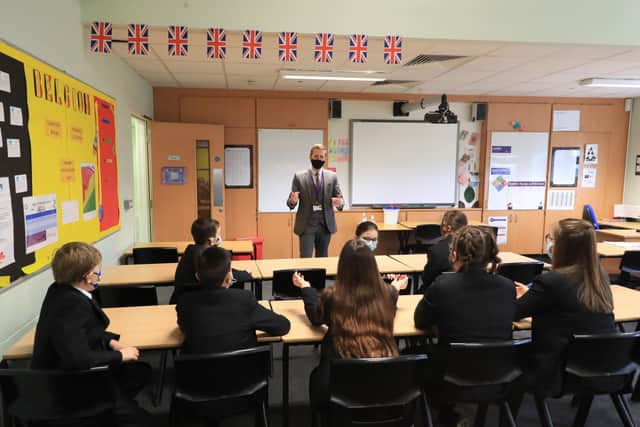The ‘slang’ words schools must ban in English language drive – GP Taylor


Standard English is under threat from the increased use of street talk amongst young people. The main issue is that the use of slang by students in exams is bringing down marks and lowering the pass rate.
Advertisement
Hide AdAdvertisement
Hide AdSuch is the pressure on them to conform to youth-speak that they cannot differentiate between what is and is not acceptable English in exams.


In some areas, the problem is so bad that a secondary school in London, Ark All Saints Academy, is trying to stop its students from using slang in their sentences and get rid of phrases such as “oh my days” in a crackdown on slang in class.
The school has come up with a list of words and phrases that cannot be used in class. This includes “he cut his eyes at me”, OMG and LOL. Also, the students should not be able to use “that’s long”, which can mean something that is tedious, or “that’s a neck” which means a comment or action is stupid. “Bare”, “wow”, “cuss” and “oh my God” are also out. They are also being discouraged from starting sentences with ‘like’ or ‘basically’.
Advertisement
Hide AdAdvertisement
Hide AdLucy Frame, the principal at the school in Camberwell, said: “The development of reading and speaking skills is a central part of what drives our school to help our students learn effectively and fulfil their potential in academic and non-academic ways.


“None of the words or phrases listed are banned from general use in our school or when our students are interacting socially. But this list is used in some formal learning settings to help students understand the importance of expressing themselves clearly and accurately, not least through written language in examinations.”
In other words, all the school hopes to do is encourage students to use the right words in the right setting. It may seem such a trivial thing, but having a universally understandable language is very important. There still is a place for the use of standard English.
I am very proud of my Yorkshire accent and dialect. Some of the words I use in daily life may be alien to the southerner. I avoid using the words when I am on television or radio.
Advertisement
Hide AdAdvertisement
Hide AdI recently finished a really good children’s book by Frank Boyce called Noah’s Gold. It was enjoyable from start to finish. The only thing that marred the story was the use of the word ‘rogue’. No longer did this mean a bad person, but in kid-speak it means something that is good or cool. I became hyper-aware every time it was used, it just didn’t fit in with the story.
Once, during an author visit to a school, I had to ask a teacher to translate because I actually could not understand the comment a student made because, as a then 50-something, the words in the sentence made no sense.
Language slang isn’t just down to regional accents or cultural differences. There has to be a common standard in English for it not to fragment further until we can no longer understand each other. Young people have to realise that copying the speech patterns of their favourite singer or video game character isn’t cool when it makes what you say gobbledegook.
Personally, I believe it is a good thing that some schools have the courage to ask pupils to have a higher standard in language. Coming from a working-class background, I benefitted from having a teacher who insisted on me speaking the Queen’s English. It has been the one thing that helped me get on in life. The ability to communicate is a very undervalued commodity.
Advertisement
Hide AdAdvertisement
Hide AdHowever, the attempts by schools to stop slang has not been without criticism. Some people have felt that children have a right to speak however they like and that stopping them using slang is an attack on their culture.
Surely, the important issue is having young people in our society who have the ability to communicate with others without having to have a translator to decipher what they are saying?
The classroom should be the place where pupils are taught standard English. Whatever words or phrases they use outside that environment is up to them. It is the role of schools to prepare their students for the society in which they live.
In the long term, standard English will slowly change. After all, Shakespeare gave us the word ‘swagger’ and ‘selfie’ crept into the dictionary in 2013. There has to be a common standard of spoken English and that should start in school.
Advertisement
Hide AdAdvertisement
Hide AdGP Taylor is a writer and broadcaster. He lives in East Yorkshire.
Support The Yorkshire Post and become a subscriber today. Your subscription will help us to continue to bring quality news to the people of Yorkshire. In return, you’ll see fewer ads on site, get free access to our app, receive exclusive members-only offers and access to all premium content and columns. Click here to subscribe.
Comment Guidelines
National World encourages reader discussion on our stories. User feedback, insights and back-and-forth exchanges add a rich layer of context to reporting. Please review our Community Guidelines before commenting.